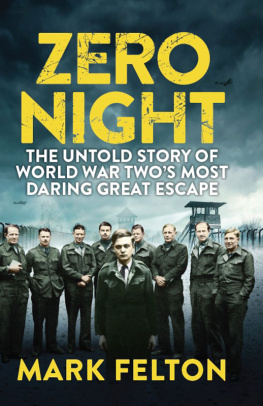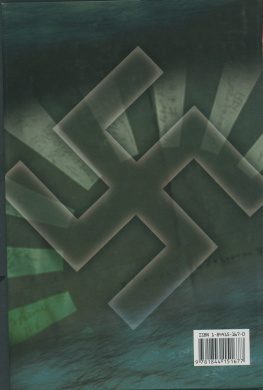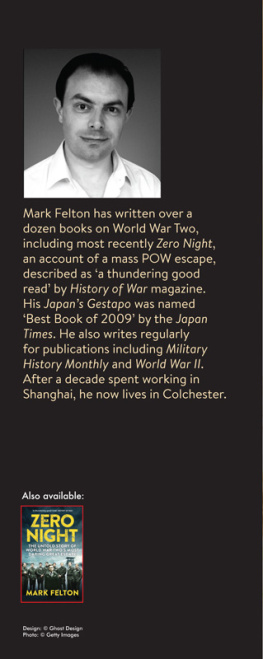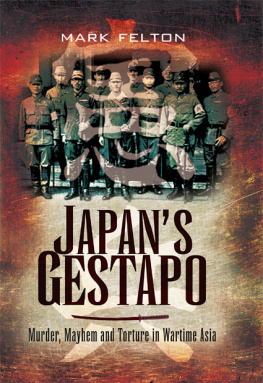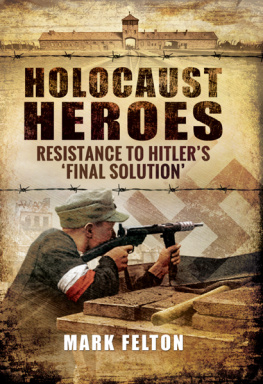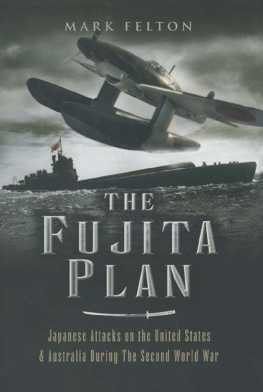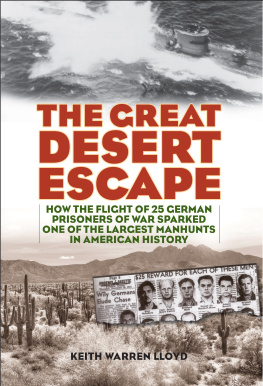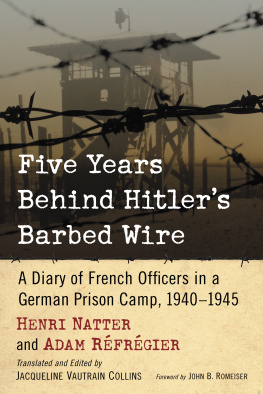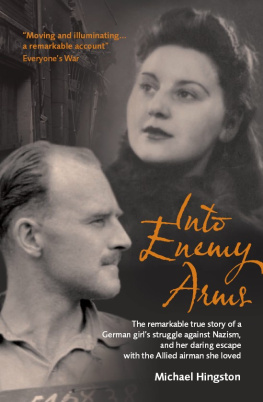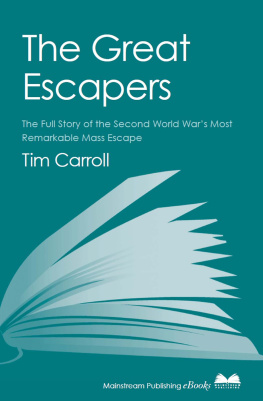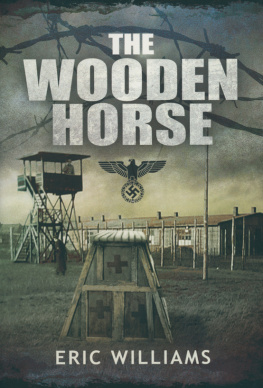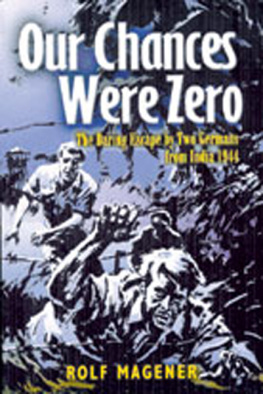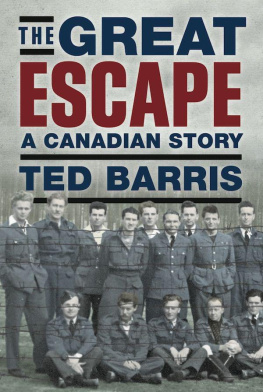ZERO NIGHT
ZERO NIGHT
THE UNTOLD STORY OF WORLD WAR TWOS MOST DARING GREAT ESCAPE
MARK FELTON

Published in the UK in 2014 by
Icon Books Ltd, Omnibus Business Centre,
3941 North Road, London N7 9DP
www.iconbooks.com
Sold in the UK, Europe and Asia
by Faber & Faber Ltd, Bloomsbury House,
7477 Great Russell Street,
London WC1B 3DA or their agents
Distributed in the UK, Europe and Asia
by TBS Ltd, TBS Distribution Centre, Colchester Road,
Frating Green, Colchester CO7 7DW
Distributed in Australia and New Zealand
by Allen & Unwin Pty Ltd,
PO Box 8500, 83 Alexander Street,
Crows Nest, NSW 2065
Distributed in South Africa by
Jonathan Ball, Office B4, The District,
41 Sir Lowry Road, Woodstock 7925
Distributed in India by Penguin Books India,
11 Community Centre, Panchsheel Park,
New Delhi 110017
ISBN: 978-184831-719-2 (hardback)
ISBN: 978-184831-792-5 (paperback)
Text copyright 2014 Mark Felton
The author has asserted his moral rights.
No part of this book may be reproduced in any form, or by any means, without prior permission in writing from the publisher.
Typeset in Adobe Text by Marie Doherty
Printed and bound in the UK by Clays Ltd, St Ives plc
List of Illustrations
About the author
Mark Felton has written over a dozen books on prisoners of war, Japanese war crimes and Nazi war criminals, and writes regularly for magazines such as Military History Monthly and World War II. He is the author of Today is a Good Day to Fight, an acclaimed history of the American West, and Japans Gestapo (named Best Book of 2009 by The Japan Times). His most recent book is China Station: The British Military in the Middle Kingdom, 18391997. After a decade spent working in Shanghai, Dr Felton now lives in Colchester. He is married with one son.
To Fang Fang,
with love
Acknowledgements
I should like to acknowledge the kind assistance of many individuals who have contributed so much of their time, knowledge and in many cases their memories to this project to tell the stories of the Warburg Wire Job escapers. This book could not have been written without them. They are: Major Michael Bond (Tom Stallards godson); Ben Hamilton-Baillie (Lieutenant Jock Hamilton-Baillies son); Colonel Richard Cousens, OBE (son of Major Johnnie Cousens); Kenneth Jacob (son of Warburg POW Captain Kenneth Jacob); Kevin Storey, BEM, Durham Light Infantry Museum Curator; Liz Bregazzi, County Archivist, Durham County Record Office; Joanne Penny, Service Personnel and Veterans Agency; Jo-Anne Watts, Liaison Librarian, University Library, Keele University; Sally Richards and Shahera Begum, Imperial War Museum, London; Major Chris Lawton, MBE, Officer-in-Command, The Rifles Office, Durham; Anne Beckwith-Smith; Major Colin Hepburn, Regimental Secretary, The Royal Tank Regiment; Emily Dezurick-Badran, Cambridge University Library; Amanda Tom, Archivist, Harriet Irving Library, University of New Brunswick; Philip Chinnery, Historian, Ex-Prisoners of War Association; Steven Tagg, Doncaster Museum and Art Gallery; Nina Janz, Bundesarchiv, Abteilung Militrarchiv, Freiburg; Matthew Homyk and Patricia Kahney; and Shirley Felton. A great many thanks to Andrew Lownie, my fantastic agent, whose enthusiasm and encouragement are deeply appreciated, and to my editor Duncan Heath and the excellent team at Icon Books.
Finally, I want to thank my wonderfully accomplished wife Fang Fang for her support, encouragement, advice and love.
A note on the text
Most of the dialogue sequences in this book come directly from the veterans themselves, from written sources, diaries or spoken interviews. I have changed the tense to make it more immediate. Occasionally, where only basic descriptions of what happened exist, I have created small sections of dialogue, attempting to remain true to the characters and to their manners of speech.
Prologue
A shilling coin jangled insistently inside an empty tin can, followed by someone whispering Get out, Doug! in an urgent hiss. Muttering a stream of oaths under his breath, Doug Crawford quickly reversed out of the narrow tunnel, its wet clay walls lit by a single guttering carbide lamp near the tunnel face.
Doug, hurry up, the Jerries are on their way! hissed Captain David Fielding, sitting on the wooden floor of the deserted silence hut next to the camp library. The tunnel was almost finished and Crawford had been working on the vertical shaft below the exit hole when the alarm was given. Somehow, the Germans had found out about the tunnel and were racing towards them across the huge camp, hoping to capture the diggers and their escape hole.
Several other members of the digging team crouched by the tunnel entrance, their faces masks of apprehension. By the window one man was stooging, acting as a lookout. Beyond the hut several other stooges kept watch for Germans, using prearranged signals. Theyre coming, hissed the stooge by the window. Maybe three minutes! Fielding frantically pulled the long piece of string attached to the rudimentary tin can alarm, his heart racing and his guts in nervous tumult. He yelled down the dark shaft: Im sorry Doug, its every man for himself! Seconds later the digging team dispersed into the compound, striding off in different directions to confuse the Germans.
Emerging from the tunnel entrance into the room like a mole coming up for air, Captain Crawford presented a dreadful sight. Dressed incongruously in long white underpants tucked into long socks, a balaclava helmet and a long-sleeved woollen singlet, he was covered in mud from head to toe. But there would be no time to clean up he had to get out of the hut and back to his accommodation before the German guards arrived, or face a lengthy spell in solitary confinement for his trouble.
A great pile of wet dirt lay on the hut floor, feverishly excavated with homemade tools, tin cups and bare hands. They had been doing what the prisoners called a blitz a fast breakout limited to a small handful of escapers.
Alexander Doug Crawford of the Royal Australian Artillery caused quite a stir as he and Fielding attempted to stroll nonchalantly through Oflag VI-B after the rest of the diggers had scattered from the silence hut. He looked like he was on his way home from a long day at the coalface, and expected instant arrest. Two Germans came running towards him, and to his horror he saw that one of them was Hauptmann Rademacher, the camp security officer, with a shorter private puffing along behind him, a rifle slung over his shoulder. Crawford tensed, expecting to be staring down the barrel of a Luger in the next few seconds. But, incredibly, the Germans just jogged past on their way to the hut containing the tunnel, not even glancing at the Australian. The prisoners often joked that their captors were single-minded in the extreme, and Crawfords lucky escape seemed to confirm this view. Not keen to push his luck any further, Crawford ducked into the nearest accommodation hut to try to make himself more presentable before slipping back to his own billet.
It was the second blitz tunnel that Crawford, Fielding and their small team had lost to the Germans in the past few weeks. Their first effort had almost reached the perimeter fence. The air in the thing was foul, recalled Crawford. It was twenty inches base, twenty inches upright, and oval in shape, because we were digging in clay. When the Germans discovered Crawfords first tunnel they filled it in, from the edge of the building out to the wire. The second effort was an attempt to quickly dig into the loosely filled-in Fielding had told Crawford the night before they began.
Next page
